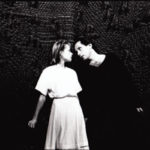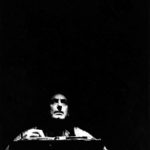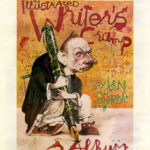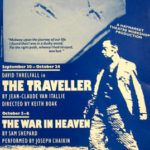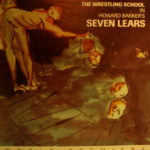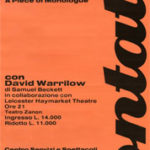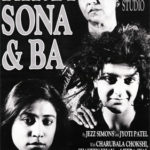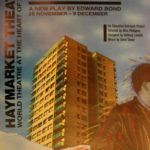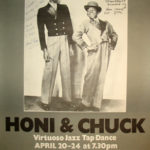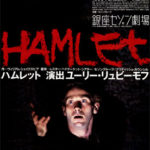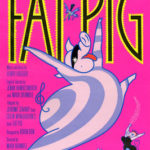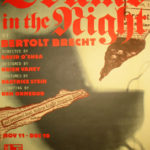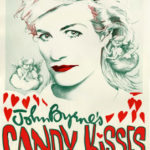Artistic and Theatre Directing
At both The Leicester Haymarket and the Traverse Theatre, I developed artistic policies that put newly commissioned local and national plays in conversation with the best international theatre. The vision was to engage existing audiences in new relations to theatre and to build completely new audiences from increasingly diverse communities. Many of the productions probed the question of how to write epic plays addressing big political issues in a studio space, and whether it was possible to build company and ensemble work within a repertory system.
Earlier Plays Directed
Director of Classical Plays/Revivals and Musicals
Travesties by Tom Stoppard. Liverpool Playhouse.
Bodies by James Saunders. Liverpool Playhouse.
Filumena by Eduardo De Fillipo. Liverpool Playhouse.
Laurel & Hardy by Tom McGrath. Liverpool Playhouse.
Revenger’s Tragedy by Cyril Tourneur. Liverpool Playhouse.
The Fantasticks by Jones. Liverpool Playhouse.
Every Good Boy Deserves Favour by Tom Stoppard and Andre Previn. Scottish National Orchestra. Toured Edinburgh, Glasgow and Stirling.
My Fair Lady by Lerner and Loewe. Scottish Opera.
Bread & Butter by C.P. Taylor. Traverse Theatre, Edinburgh.
The Sea by Edward Bond. Leeds Playhouse.
Summer & Smoke by Tennessee Williams. Leicester Haymarket Theatre.
Guys and Dolls by Frank Loesser. Leicester Haymarket Theatre.
The Crucible by Arthur Miller. Leicester Haymarket Theatre.
Human Cannon by Edward Bond. Manchester Metropolitan University.
Tartuffe by Moliere. University of California Davis.
Women of Troy by Euripides. Manchester Metropolitan University.
Richard III by Shakespeare. Manchester Metropolitan University. Peer Gynt. Manchester Metropolitan University.
Romeo and Juliet by Shakespeare, University of California Davis. Two full productions.
The Merchant of Venice by Shakespeare, Manchester Metropolitan University.
Anthony and Cleopatra by Shakespeare, Manchester Metropolitan University.
Grimm’s Tales by Carol Ann Duffy, Manchester Metropolitan University
Woman in Mind by Alan Ayckbourn, Manchester Metropolitan University
Hamlet, Manchester Metropolitan University
A Midsummer Night’s Dream, Main Theatre, Davis, CA
Director of New Plays include:
Wax by Howard Barker. Traverse Theatre, Edinburgh and Bush Theatre, London.
Me by C.P. Taylor. Traverse Theatre, Edinburgh.
The Collected Works of Billy the Kid by Michael Ondaatje. Traverse Theatre, Edinburgh.
And They Used to Star in Movies by Campbell Black. Traverse Theatre, Edinburgh.
Next Time...by Paul Vincent. Traverse Theatre, Edinburgh.
The Hardman by Tom McGrath & Jimmy Boyle. Traverse Theatre, Edinburgh. AND an extensive tour of Britain which included Glasgow, Liverpool, Birmingham, Cardiff, I.C.A. London; and the Kammerspiele, Munich.
A & R by Pete Atkin. Traverse Theatre, Edinburgh.
The Peter Pan Man by C.P. Taylor. Scottish Youth Theatre.
Livingstone and Sechele by David Pownall. Traverse Theatre, Edinburgh. AND Lyric Theatre, Hammersmith.
Magic by William Grant. Traverse Theatre, Edinburgh.
The Black Stuffer by Elizabeth Bond. Traverse Theatre, Edinburgh.
Royal Flush by William Grant. Traverse Theatre, Edinburgh.
Accounts by Michael Wilcox. Traverse Theatre, Edinburgh.
AND Riverside Studio, London.
Filmed by Channel Four Television. Recipient of George Devine Award.
The Hot Hello by David Pownall. Traverse Theatre, Edinburgh.
Sailmaker by Alan Spence. Traverse Theatre, Edinburgh.
Not Waving by Catherine Hayes. Traverse Theatre, Edinburgh.
The Boys in the Backroom by Andrew Dallmeyer. Traverse Theatre, Edinburgh.
Space Invaders by Alan Spence. Traverse Theatre, Edinburgh.
Clean Sweeps by Stuart Patterson. Traverse Theatre, Edinburgh.
78 Revolutions by Michael Wilcox. Traverse Theatre, Edinburgh, AND Lyric Theatre, Hammersmith.
An Historie of the Machine by Martyn Hobbs. Traverse Theatre, Edinburgh.
Dead Men by Mike Stott. Traverse Theatre, Edinburgh. AND Perth Festival, Australia.
The Price of Experience by Ken Ross. Traverse Theatre, Edinburgh.
Aus der Fremde by Ernst Jandl. Traverse Theatre, Edinburgh.
Bosom Buddies by Jack Klaff. Assembly Rooms, Edinburgh AND Riverside Studios, London.
Artistic and Theatre Directing
At both The Leicester Haymarket and the Traverse Theatre, I developed artistic policies that put newly commissioned local and national plays in conversation with the best international theatre. The vision was to engage existing audiences in new relations to theatre and to build completely new audiences from increasingly diverse communities. Many of the productions probed the question of how to write epic plays addressing big political issues in a studio space, and whether it was possible to build company and ensemble work within a repertory system.
Leicester Haymarket: Executive And Artistic Director
Coming to the Haymarket in 1986 I moved into a very different realm of theatre. The Haymarket is the fourth largest public theatre in Britain; my post there was as Executive and Theatre Director, which included artistic, financial and administrative responsibility for a theatre with a turnover of £3-4 million, two theatres, a permanent staff of 85 and a production staff of up to an additional 80 people.
What my experience at the Leicester Haymarket highlighted was the need to get the attention of a varied audience for things that they would not normally expect to come and see. Probably the most important ways of gaining the audience’s confidence that I encouraged were first, open attempts to come out to the community and to be seen to be responding to its concerns, and second, the ability to present productions to the local audience that are seen to be important, exciting and challenging in other people’s eyes. Building the commercial side of the theatre by extending the number of visiting commercial companies, touring home-grown productions or transferring plays into the West End, was a way not only of talking to other communities but also of encouraging the immediate community to participate and try a new development. This kind of exchange and liaison allowed me to increase the productions of new plays, to bring more challenging work to the main stage, and to introduce international companies to a Leicester audience. By 1988 the Haymarket was recognised as Britain’s premier theatre for international drama.
Under my direction the theatre made a series of bold moves out into addressing the needs of its audiences. Over 1988 to 1990 I created an education liason department which commissioned Rambert Dance Company to come to Leicester one week a year to work in the schools, which also commissioned Edward Bond to write a play to be performed in schools and non-theatre venues throughout Leicestershire, which ran education days at the theatre for students, and which supported the Haymarket Youth Theatre. Among its activities was helping produce the 2-week long Leicester Schools Festival of dance and drama on the Haymarket stages. Close links were also established with the Leicester Polytechnic (now DeMontfort University), out of which came people who worked in marketing and finance, as well as acting, directing and music. I also developed community links and commissioned work for and from the large Asian community, including Jyoti Patel’s KURTI, SONA AND BA and an opera based on J P Narayan’s The Tiger of Malgudi.
The Leicester International Dance Festival which I established presented Merce Cunningham who created a dance piece specifically for the Haymarket space, and Chhau from India. Also at the first Festival was the Rambert Dance Company, with whom there was already a special artistic relationship. The Haymarket and Rambert co-commissioned a new piece choreographed by Lucinda Childs to the music of Gavin Bryars. I radically increased the number of visiting musical performances, and among the individual musicians who performed at the Haymarket were Gavin Bryars, John Zorn and Nusrat Fateh Ali Khan, some of whom were among the many composers commissioned to write original music for productions. Groups who played at the theatre varied from contemporary music ensembles to medium-scale operatic companies.
What I learned from the Leicester Haymarket was that the ability to establish a long-term discussion with your audience gives it the confidence to take chances. Despite the extremely conventional attitudes of this regional audience when I arrived, two years further on the theatre was filling all seats for Samuel Beckett and Howard Barker plays and welcoming the Georgian Rustaveli company and a Russian Shakespeare. Unusually the Leicester Haymarket allowed me to bring together experience with new writing and work within a classical and commercial dramatic tradition.
This combination encouraged me not only to treat the classics as new and challenging plays, but also to understand how new writing can learn from the classics and that the challenge of new writing can contribute to and augment the dramatic tradition.
People I worked with include: Frances Barber, Howard Barker, Edward Bond, David Borowsky, Mark Bramble, Gavin Bryars, Anna Carteret, Joseph Chaikin, Kandis Cook, Eduard Tchikvadze, John Dexter, Paul Freeman, Jocelyn Herbert, Anthony Hopkins, Eiko Ishioka, Yuri Lyubimov, Henry Krieger, Joe McGann, Stephen McGann, Joe Marcell, Dan Massey, Gemma Regrave, Gregory Motton, Jyoti Patel, Annie Smart, David Threlfall, Nick Ward, David Warrilow, Kevin Whateley.
Plays I scheduled and produced included: Shakespeare’s Julius Caesar and Stephen Spender’s Creon, both of which were directed by John Dexter and designed by Jocelyn Herbert, and after visiting the Belfast Festival went on a major British Council tour of India; M. Butterflyby David Henry Hwang, again directed by John Dexter and designed by Eiko Ishioka, starring Anthony Hopkins, which transferred to the Shaftsbury Theatre in London’s West End; Samuel Beckett’s Krapp's Last Tape and Catastrophe starring David Warrilow which were the last productions that Beckett had a direct involvement with before he died – they played at London’s Riverside Studio and were televised by BBC before going to the Festival D’Automne in Paris and Brooklyn’s Next Wave Festival; Yuri Lyubimov’s production of Hamlet which toured extensively around the world including: Rome, Berlin, London, Adelaide and Tokyo.
The Traverse Theatre: Artistic Director
The Traverse Theatre is a theatre devoted to new writing by new writers. My policy was to open up the possibilities for these writers to respond to and participate in a broad theatrical and social context by encouraging the development of a wide range of theatre styles, by inviting productions that brought music and dance to the theatre, and by building an extensive season of international and multiracial visiting companies: for example I started Scotland’s Modern Dance Umbrella in 1982. The effect was to generate a radical artistic development of political and social issues, and led to an expansion of the theatre into a second theatre space and the taking on of an associate director. Looking back, I can see that the diversity of theatre styles I encouraged split between small personal dramas about negotiating relationships in local communities, and the fables, histories, superrealistic and classical styles that are about bringing the personal into a theatre that can question the larger social and political structures around us. Both approaches are about how we tell stories about ourselves to ourselves and to other people. The freelance work that I did during this period and shortly after built on this understanding, and effectively tried to treat the classics as new writing in terms of production, at the same time as using the common cultural context of the classics to initiate broad discussions about immediate issues such as family, gender, race, and nation.
People I worked with include: Yvonne Bryceland, John Byrne, David Calder, Simon Callow, Robbie Coltrane, Chris Hannan, Catherine Hayes, David Hayman, Liz Lochhead, Carmel McSharry, Sue Mayes, Colette O’Neill, Kate Saunders, Barney Simon, Ken Stott, Mike Stott, Tilda Swinton,Les Waters, Kevin Whateley, Michael Wilcox, Richard Wilson, Susannah York.
Plays I scheduled and produced include: Trafford Tanzi, which became a worldwide success; The Slab Boys Trilogy, which was produced on London and Broadway; Woza Albert! in its premiere outside of South Africa; Andre Wadja’s Nastassia Filipovna; Emily Mann’s Still Life; and Michel Tremblay’s Sandra/manon.
Liverpool Playhouse:
Associate Director (1979-81)
The Liverpool Playhouse is a major regional theatre with two auditoria, one a Victorian theatre that seats 550 and the other a 200 seat studio. Under artistic director William Gaunt there was a balance between classics and embracing the strong voice of Liverpool writers such as Willy Russell, Alan Bleasdale and Catherine Hayes.
